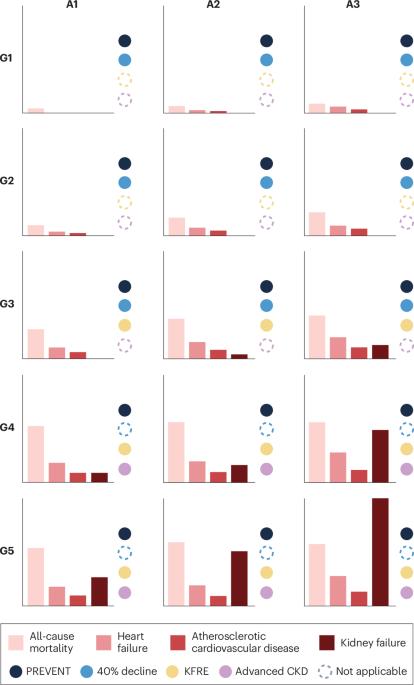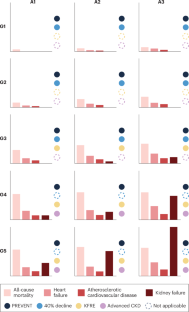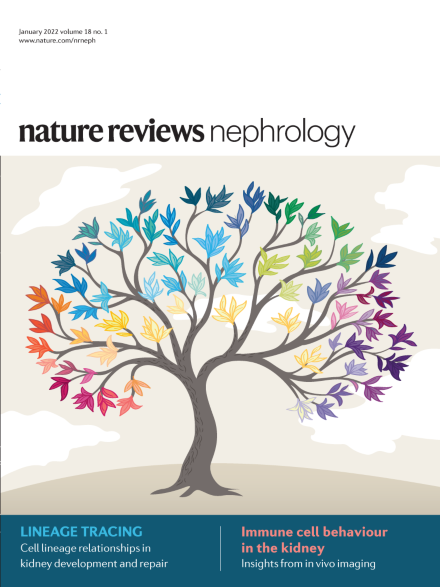Risk-directed management of chronic kidney disease
IF 39.8
1区 医学
Q1 UROLOGY & NEPHROLOGY
引用次数: 0
Abstract
The timely and rational institution of therapy is a key step towards reducing the global burden of chronic kidney disease (CKD). CKD is a heterogeneous entity with varied aetiologies and diverse trajectories, which include risk of kidney failure but also cardiovascular events and death. Developments in the past decade include substantial progress in CKD risk prediction, driven in part by the accumulation of electronic health records data. In addition, large randomized clinical trials have demonstrated the effectiveness of sodium–glucose co-transporter 2 inhibitors, glucagon-like peptide 1 receptor agonists and mineralocorticoid receptor antagonists in reducing adverse events in CKD, greatly expanding the options for effective therapy. Alongside angiotensin-converting enzyme inhibitors and angiotensin receptor blockers, these classes of medication have been proposed to be the four pillars of CKD pharmacotherapy. However, all of these drug classes are underutilized, even in individuals at high risk. Leveraging prognostic estimates to guide therapy could help clinicians to prescribe CKD-related therapies to those who are most likely to benefit from their use. Risk-based CKD management thus aligns patient risk and care, allowing the prioritization of absolute benefit in determining therapeutic selection and timing. Here, we discuss CKD prognosis tools, evidence-based management and prognosis-guided therapies. Several risk tools can accurately predict individual baseline risks of adverse events in people with chronic kidney disease. Here, the authors examine methods of assessing risk and discuss risk-directed patient management, whereby risk is aligned with care delivery to maximize the benefit of available therapeutic strategies.


慢性肾脏疾病的风险导向管理
及时和合理的治疗制度是减少慢性肾脏疾病(CKD)全球负担的关键一步。CKD是一个异质性的实体,具有不同的病因和不同的轨迹,包括肾衰竭的风险,也包括心血管事件和死亡。过去十年的发展包括慢性肾病风险预测方面的重大进展,部分原因是电子健康记录数据的积累。此外,大型随机临床试验已经证明了钠-葡萄糖共转运蛋白2抑制剂、胰高血糖素样肽1受体激动剂和矿皮质激素受体拮抗剂在减少CKD不良事件方面的有效性,极大地扩展了有效治疗的选择。与血管紧张素转换酶抑制剂和血管紧张素受体阻滞剂一起,这类药物被认为是CKD药物治疗的四大支柱。然而,所有这些药物类别都没有得到充分利用,即使在高危人群中也是如此。利用预后评估来指导治疗可以帮助临床医生为那些最有可能从中受益的人开出ckd相关治疗的处方。因此,基于风险的CKD管理使患者的风险和护理保持一致,允许在确定治疗选择和时机时优先考虑绝对收益。在这里,我们讨论CKD预后工具,循证管理和预后指导治疗。
本文章由计算机程序翻译,如有差异,请以英文原文为准。
求助全文
约1分钟内获得全文
求助全文
来源期刊

Nature Reviews Nephrology
医学-泌尿学与肾脏学
CiteScore
39.00
自引率
1.20%
发文量
127
审稿时长
6-12 weeks
期刊介绍:
Nature Reviews Nephrology aims to be the premier source of reviews and commentaries for the scientific communities it serves.
It strives to publish authoritative, accessible articles.
Articles are enhanced with clearly understandable figures, tables, and other display items.
Nature Reviews Nephrology publishes Research Highlights, News & Views, Comments, Reviews, Perspectives, and Consensus Statements.
The content is relevant to nephrologists and basic science researchers.
The broad scope of the journal ensures that the work reaches the widest possible audience.
 求助内容:
求助内容: 应助结果提醒方式:
应助结果提醒方式:


